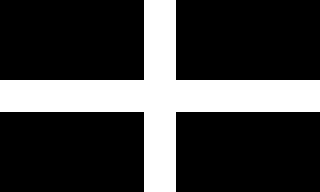Angwin is a Cornish language surname that means 'the white'. Notable people with the surname include:
Carew is a Welsh and Cornish habitation-type surname; it has also been used as a synonym for the Irish patronymic Ó Corráin. Carey can be a variant.

The constitutional status of Cornwall has been a matter of debate and dispute. Cornwall is an administrative county of England.
Jenkin, of Franconian origin, is translated in English as "Little John" or more literally "John the little".
Chenoweth is a name of Cornish origin meaning "new house" in the Cornish language. Chenowith, Chinowith, Chernoweth, and Chernowith are alternative spellings.
Jenkins is a surname that originated in Cornwall, but came to be popular in southern Wales. The name "Jenkin" originally meant "little John" or "son of John". The "kin" portion is of Dutch or Danish origin (-kijn), which then gained a certain popularity in England.
Tremayne is a Cornish language surname.
Grose is a surname of two possible origins. Cornish origin: a toponymic surname for a person who lived near a stone cross, from Cornish "crows" or "crous" for "cross". French origin: from Old French gros: "big, "fat", a variant of surname Gros.
Cornish Americans are Americans who describe themselves as having Cornish ancestry, an ethnic group of Brittonic Celts native to Cornwall and the Scilly Isles, part of England in the United Kingdom. Although Cornish ancestry is not recognized on the United States Census, Bernard Deacon at the Institute of Cornish Studies estimates there are close to two million people of Cornish descent in the U.S., compared to half a million in Cornwall itself and only half of those Cornish by descent.
Cornish surnames are surnames used by Cornish people and often derived from the Cornish language such as Jago, Trelawney or Enys. Others have strong roots in the region and many in the UK with names such as Eddy, Stark or Rowe are likely to have Cornish origins. Such surnames for the common people emerged in the Middle Ages, although the nobility probably had surnames much earlier on. Not until the later Middle Ages did it become necessary for a common man to have a surname. Most surnames were fully established throughout Cornwall by the end of the 15th century. Cornish surnames can be found throughout the world as part of the Cornish diaspora.
Bolitho is a surname of Cornish origin, derived from Bolitho in west Cornwall. Notable people with the surname include:
Tredinnick is a Cornish surname. It derives from one of the places called Tredinnick; Tredinnick is formed from the elements "tre-" (homestead) and either "dynek" (fortified), "eythynek" or "redynek".
Trebilcock is a Cornish surname, pronounced "tra-BILL-co". It derives from Trebilcock in the parish of Roche; Trebilcock is formed from the elements "tre" (homestead) and a mutated form of ME "pilicock" (darling).
Hosking is a surname of Cornish origin. In Cornwall there are also the variant forms Hosken, Hoskin and Hoskins. Unlike many Cornish surnames which are associated with a small district, Hosking and its variants are distributed in west Cornwall, mid Cornwall (Hoskins) and east Cornwall (Hoskin). It has the meaning "sedgeman", i.e. a thatcher who makes roofs of sedge.
Penix is a Cornish-language family name originating in Cornwall. In medieval times, people were known by their given names, but as the population grew, surnames were added based on the place that they owned or lived in to distinguish people from one another. While Celtic people tended to use patronymic names, many Cornish people used local place names as surnames, sometimes in addition to patronymics.
Couch is a surname. It has two different origins. It is a Cornish name thought to have derived from Cornish "cough" (red) and to have been a nickname for a redheaded man. The Cornish surname appears in 1160 as "Coh" and over the centuries as "Coch," "Cogh," "Cooch," "Cough," "Cuche," "Cowche," "Cowtch," "Coutch," etc., until the spelling became standardized in recent centuries, generally as "Couch." There is also an English name Couch which probably originated as a name for a maker of beds or bedding. The English surname has variant forms Coucha, Couche, Coucher, Couchman and Cowcha.
Bodrugan is a Cornish surname and placename. It may refer to:
Penhaligon is a surname originating in Cornwall, Great Britain. Notable people with the surname include:
Angove is a Cornish surname. This surname originates from the Cornish language, a Celtic language, and is common in Cornwall. The name is a compound of the definite article "an" i.e. the, plus the word "gov", meaning smith, and is thus an equivalent of the English surname Smith. In the 1881 UK census the surname Angove was restricted to Cornwall and the proportion of people with the surname Smith was much lower in Cornwall than elsewhere the UK. The name was originally an occupational name and denoted a metal worker, it is the most common Cornish occupational surname. During the 16th century the surname was limited to the western half of Cornwall where Cornish was still spoken.
Penrose is a Cornish-language surname. The surname Penrose is derived from one of the places called Penrose in England and Wales: these are found in ten parishes in Cornwall, several times in Wales and once in Herefordshire.
This page is based on this
Wikipedia article Text is available under the
CC BY-SA 4.0 license; additional terms may apply.
Images, videos and audio are available under their respective licenses.
